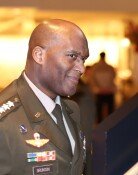[Washingtons Policy on Korean Peninsula] <3> Who Decides North Korean Policies and How.
[Washingtons Policy on Korean Peninsula] <3> Who Decides North Korean Policies and How.
Posted January. 15, 2004 15:55,
Since the 9/11 terror and especially since North Korea has admitted the presence of their highly enriched uranium (HEU) program, North Korean policies are one of the important issues that President Bush takes care of himself. This is because he sees the problem as directly related to the U.S.s security.
A governmental authority that I met in Washington DC and other experts said that the American view on the issues of the Korean peninsula has changed greatly since 9/11. In particular, President Bush has taken care of the North Korean policies himself as well as the growing influence of the so-called Cheney Factor.
Things are different than during the Clinton administration: A discernible change is the realistic conclusion of the policies on the Korean peninsula arising out of meetings of the highest executives, not from working-level officials or diplomatic channels. It is a difference from the Clinton Administration that many of the recommendations from the working-level officials were reflected in the policy-making.
An authority in the U.S. Administration in Washington explained, The U.S., unlike Korea, is concerned about the possibility that North Korea will sell its weapons of mass destruction (WMD) or its technology abroad. That is the direct threat to our national security.
Another change from the Clinton administration is that the participation of think tanks and scholarly groups has been decreased in the policy-making process. The Clinton administration used to spend much time in comparing and analyzing the different views of papers in the scholarly press and policy proposals. Balvina Hwang at the Heritage Foundation reminisces that, It was like doing a seminar.
In particular, reports by the Council of Foreign Relations (CFR) of the U.S. used to be reflected in the North Korean policy basis. A related official at the Korean Ministry of Trade and Diplomacy said, During that time, after the CFR sent their envoys to Korea to finish their policy proposals and meet our governmental officials and scholars, we were able to predict to some degree what their keynote policy proposals would be. There was a close channeling that they even sent a working paper to us and asked for our advice.
However, the atmosphere has all changed now. David Steinberg, a professor at Georgetown University, says, All the off-the-record remarks from the administrative officials now are something that would appear in their PR catalogue. The Bush Administration is well-known for its silent policy regarding their current issues that any other administrations so far.
Another reason why the conclusion is only drawn at the highest executive officials meeting is because there is an existing discord within the Administration. A governmental official says, If one is not directly related to the current issue, it is hard to find out what the issue is about, and added, That shows how tight the secrecy is, but it is difficult for them to draw an agreeing point of different opinions. There are many differing working-level opinions and the disputes are bound to be disclosed. The most representative examples were the three-party talk in Beijing in April and the first of the six-party talks in August last year.
Right before the three-party talk was held, National Defense Secretary Donald Rumsfeld, one of the headliners, had sent letters to high staff officers at the White House three times. In his third letter, he asked, The head delegate should be the Undersecretary of Arms Control John Bolton or Senior Director for Proliferation Strategy Counter-proliferation and Homeland Defense at the National Security Council (NSC) of the White House Robert Joseph (instead of dovish James Kelly). Undersecretary Bolton is a well-known hard-liner known as Rumsfeld in the U.S. State Department.
The head delegate did not change, but Assistant Secretary Kelly was strictly ordered not to directly speak to North Korea. As a result, Assistant Secretary Kelly could not say anything else but repeated, read my speech script to the questions of North Korea as if a parrot was speaking.
After about three months on December 7, the Washington Post reported the atmosphere at that time, With the eyes of the National Defense Department and the NSC of the White House watching him, Assistant Secretary Kelly did not feel like telling anything any more.
Victor Cha, a professor at Georgetown University said, The discord within the administration around the North Korean issues is not a secret any more, and added, There are times that the President has to speak up who holds the right of the ultimate decision.
The Cheney Factor: A related official who once was a high state official said, The Cheney factor is a characteristic of the Bush Administration, adding, Vice President Cheney is the decisive personality who puts weight on the hardliners when conflicts arise between the moderates and the hardliners.
The discord between the State Department and the National Defense Department is a traditional one in the U.S. Administration, but the decisive role to hold up the hands of the National Defense Department, the hardliners, is played by Vice President Cheney.
However, the final coordinator of Bushs decisions is generally Security Advisor Condoleezza Rice. A related official says, President Bush has ordered Advisor Rice to collect different views, but during the process, Rice only tells what she thinks as long as I know. Advisor Rice listens to other peoples opinions at the NSC meetings but only attaches her reviewed opinions when she reports to the President.
Researcher Alan Romberg at the Henry Stimson Center says, From my work experience at the NSC, I don think it has played as strongly an influential role with the President as an NSC memo saying that the Defense Department and State Department have shown different opinions, but NSC thinks this way suggests.
President Bush says in a casual gathering, I dont read newspapers, and adds, Condi with no prejudices is my information source, which demonstrates his strong trust in Advisor Rice. Another official said, Advisor Rice is very good at communicating with the President. She knows exactly what makes the president feel uncomfortable and what is the most comfortable and influential approach of speaking to him.
Deputy Assistant Secretary of Defense of Asian-Pacific Affairs Richard Lawless is considered an expert on the current affairs of the Korean peninsula even though he does not have any direct influence on the president. His wife has a Korean ethnic background. He was a former CIA agent who was stationed in Korea for a long time and speaks fluent Korean. At the State Department, the director of the Office of Korean Affairs David Straub is another Korean expert.
AT the NSC of the White House, Michael Green, who is a Japan and Korea expert, was newly appointed as the NSCs Asia senior director, NSCs Asia director-to-be Chuck Jones, Senior Director for Counter-proliferation Robert Joseph and Director for Counter-proliferation William Toby are the working-level officials for the Korean peninsula.







